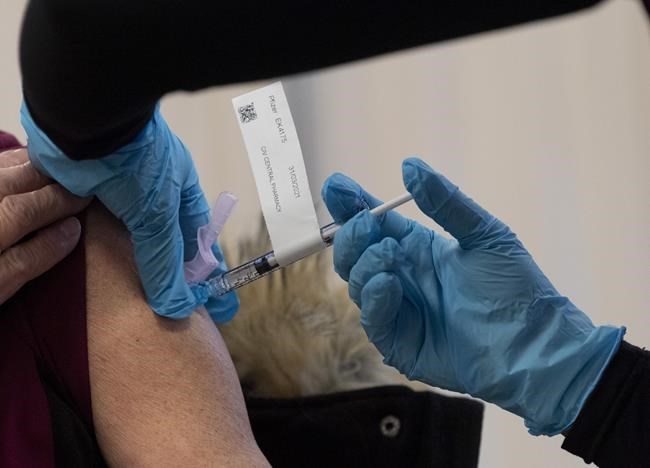Can a walk-in clinic doctor refuse to see an unvaccinated patient?
The answer, like so much right now, isn’t straightforward, according to two medical ethics experts with differing opinions.
Earlier this week, a 13-year-old boy with a sore wrist was turned away from an Enderby walk-in clinic because he wasn’t vaccinated and told to seek care at the emergency room in Salmon Arm instead.
“I was flabbergasted,” the boy’s mom, Kate Stein, told Postmedia News. “The doctor wouldn’t see us. He was only accepting fully vaccinated patients.”
The topic of how to provide care to unvaccinated patients has spurred “a lot of discussion” in the medical community, University of B.C. Prof. Dr. Michael Curry said Thursday. That’s because there are two competing interests at play: While everyone has a right to access health care, other patients and health-care workers also have a right to be protected from an unvaccinated person who may pose a health risk to them.
“People who are not vaccinated must have some ability to access care. But the question is, ‘What is the most appropriate way to do that?’ ” said Curry. “Is it in a crowded waiting room at a walk-in clinic where there are possibly people with various conditions that might make them more vulnerable” to COVID-19?
The doctor said there are several factors that could impact where unvaccinated people receive care.
“Is it a true emergency? Is it the only care centre in the community? In that case, there might be a strong obligation [for a walk-in clinic doctor] to provide care,” he said. “But if you can get the same quality or better care in a safer environment, it’s not unreasonable to ask someone to seek care there instead.”
But another ethics expert said the doctor at the Enderby walk-in clinic shouldn’t be turning away patients. B.C.’s vaccine mandate doesn’t apply until Sept. 13, and when it does come into effect, it doesn’t apply to essential services, such as health care, said Dr. Stephen Hoption Cann, a professor at UBC’s School of Population & Public Health.
“In this situation, I don’t see a reason why the physician shouldn’t provide care if presumably the physician and his staff are fully vaccinated,” he said. “If it was a more serious situation, travelling to Salmon Arm could cause health issues to get worse.”
In response to Postmedia questions about the walk-in clinic in Enderby, the Ministry of Health said “walk-in clinics are equipped and staff are trained to protect themselves and other patients from the risk of COVID-19 and other communicable diseases, so an unvaccinated patient who needs health care should generally not be turned away from a walk-in clinic, based only on their vaccination status.”
But the statement added that “depending on other details of the situation, it may be more appropriate for a patient to be seen in an emergency department than a walk-in clinic.”
Both the B.C. College of Physicians and Surgeons, which regulates the practice of medicine under provincial law, and Doctors of B.C., the association representing physicians, are clear that doctors can’t discriminate based on vaccination status, but they suggested doctors could deal differently with patients based on whether or not they’ve had the jab.
“Unvaccinated patients are at risk, and also present a risk to people around them who are immunocompromised, or who cannot be vaccinated,” Doctors of B.C. president Matthew Chow said in a statement. “Physicians may take extra precautions with eligible but unvaccinated individuals, for example by separating them from immunocompromised individuals, or booking them at the beginning or end of the day.”
In an article published online in August, the college of physicians and surgeons said registrants “must ensure unvaccinated patients are given the same access to care as vaccinated patients.”
The article continued: “It would be indefensible from an ethical point of view for a registrant to require documented proof that a patient has been vaccinated as a prerequisite for attending their office. However, it is reasonable for a registrant to request that patients report their vaccine status to them. Once aware of a patient’s vaccine status, registrants should manage appointment times in a way that does not compromise the health of other patients or their medical office staff.”
Postmedia was unable to reach the Enderby Medical Clinic or the doctor in charge, Jeff Millar. Earlier this week, Millar told the Castanet news site that the clinic’s policies were recently updated due to concerns about the number of COVID cases in Interior Health and the rise of the Delta variant.
“Those who are not fully vaccinated and have no primary care physician are told to provide their phone number and the doctor will call them to discuss their medical concerns,” reads the clinic’s new policy, which was provided to Castanet. “Those who are not fully vaccinated and have a current primary care physician are told to first call their own doctor.”
On Monday, the B.C. government announced new rules requiring citizens to provide proof of COVID vaccination to get into non-essential businesses and events, such as sports, nightclubs, restaurants and movies, beginning Sept. 13. The B.C. Civil Liberties Association called the plan, which doesn’t apply to health care, faith services or to children under age 12 who aren’t eligible for vaccines, “arbitrary and illegal.”
In a briefing, provincial health officer Dr. Bonnie Henry said proof of vaccination wouldn’t be required for essential services, including health care.
“What it applies to is those discretionary, those social events, the arts, sports, the things that we want to and need to get back to but can be a risk, so indoor group environments. That’s why we picked the places that we have, because these are discretionary. They are not essential services,” she said.
According to health authorities, vaccine bookings more than doubled to 17,000 on Monday and Tuesday after the announcement of the vaccine card. During the same two-day period last week, there were just over 8,000 bookings.



